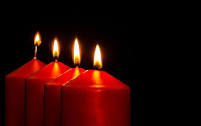A familiar Native American legend has been on my mind a lot recently. It’s the one about two wolves that reside in each human. One wolf is fear and the other is love. The two wolves are in constant struggle with each other to see which will control our lives. When the elders are asked which wolf wins the inner battle the answer is “The one you feed.”
I am very concerned that the steady diet of fear being fed to us by political candidates from both parties is so pervasive that the wolf of love in all of us is being starved to death. With all the dark money stoking the flames of fear on every form of media it is very tempting to just throw our hands in the air and surrender.
Dr. Brene Brown describes our situation this way: “In times of uncertainty, it is common for leaders to leverage fear and weaponize it to their advantage…If you can keep people afraid and give them an enemy who is responsible for their fear, you can get people to do just about anything.…when we are managing during times of scarcity or deep uncertainty, it is imperative that we embrace the uncertainty…We need to be available to fact-check the stories that team members may be making up, because in scarcity we invent worse-case scenarios.”
That reminds me of a definition of fear I learned many years ago — FEAR = False Evidence Appearing Real. We all need to use our best critical thinking to not feed the fear wolf any false information. There are plenty of factual things to fear without adding bogus dishes to our diet.
The Christian church in many ways has been complicit in spreading the bad news of a fear-based theology. The misunderstanding and mistranslation of the Hebrew word “yirah” as “fear” has been used for centuries to try and literally scare the “hell” out of people, or perhaps scare people out of hell would be a better way to put it.
Fear is not a good long-term motivator of desired behavior. It only works when an external authority figure is present to enforce the threat. But fear is a fairly effective way to produce guilt in people, and that guilt technique has been used to control church members, i.e. keep them coming back to church and paying their dues. I have often said that if people really understood the Good News of grace and God’s unconditional love the church would be out of business.
The word yirah in reference to God is better understood as “awe.” We overuse he word “awesome” these days to describe anything from a sunset to a new dress, and it has lost the power of truly standing in awe of the ultimate mystery of the creative force we call God.
If we can get back to praising that Holy Mystery and the unconditional love fed to us every moment of eternity then the wolf of fear doesn’t stand a chance. That’s the life force described in I John: “There is no fear in love, but perfect love casts out fear. For fear has to do with punishment, and whoever fears has not been perfected in love.” (I John 4:18)
Being nurtured by that kind of love makes it possible for humans to obey the great commandments to love God and to love our neighbors. Without that love, we are vulnerable to unscrupulous salespeople, propagandists, and politicians who use fear-inducing rhetoric and imagery to manipulate others into buying or believing what they are promoting.
Our United Methodist District Superintendent, Rev. Tim Bias, recently wrote about the power of words in his monthly newsletter. In there he shared a wonderful story about what feeding the wolf of love looks like at the micro level of interpersonal relationships. I’ve heard the story several times before, but the end of the story still brought tears of joy to my eyes. I share it here in the hope that it will feed your love wolf with the abundance that begs to be shared with others. If we keep the faith and treat everyone we meet, (yes, even our political foes) the way we want to be treated we will make more difference in the world than we will ever know.
“There was a first-year teacher at Saint Mary’s School in Morris, Minnesota. She said she had 34 students who were all dear to her. But one student stood out. His name was Mark. She said he was one in a million. He was very neat in appearance with a happy-to-be-alive attitude that made even his occasional mischievousness delightful. There was just one thing about Mark: he talked incessantly.
She had to remind him again and again that talking without permission was not acceptable. Every time she corrected him, he responded, “Thank you for correcting me, Teacher.”
She said, “I didn’t know what to make of it at first. But before long, I became accustomed to hearing it many times a day.”
One morning her patience was growing thin when Mark talked once too often. She said, “I made a first-year teacher mistake. I looked at Mark and said, ‘If you say one more word, I am going to tape your mouth shut!’”
It wasn’t ten seconds later when one of the students blurted out, “Mark is talking again, Teacher.” I hadn’t asked any of the students to help me watch Mark, but since I had stated the punishment in front of the class, I had to act on it.
I remember the scene as if it had occurred this morning. I walked to my desk, very deliberately opened my drawer and took out a roll of masking tape. Without saying a word, I proceeded to Mark’s desk, tore off two pieces of tape, and made a big X with them over his mouth. I then returned to the front of the room. As I glanced at Mark to see how he was doing, he winked at me. That did it! I started laughing. The class cheered as I walked back to Mark’s desk, removed the tape, and shrugged my shoulders.
His first words were, “Thank you for correcting me, Teacher.”
At the end of the year, Mark went on to fourth grade. The teacher eventually moved on to teach junior-high math. Several years passed. As Mark entered the ninth grade, Mark and the teacher met again.
She said Mark was more handsome than ever and just as polite. Since he had to listen carefully to the instruction on the “new math,” he did not talk as much. One Friday, things just didn’t feel right. The class had worked hard on a new concept all week, and the teacher sensed that the students were frowning, frustrated with themselves, and edgy with one another.
To stop the crankiness, she asked the students to put their books away and to take out two sheets of notebook paper. She then asked them to list the names of the other students in the room on their paper, leaving a space between each name. Then she asked them to think of the nicest thing they could say about each of their classmates and write it down.
It took the remainder of the class period to finish their assignment. As the students left the room, each one handed her their papers. Mark said, “Thank you for teaching me today, Teacher. Have a good weekend.” That Saturday, she wrote down the name of each student on a separate sheet of paper and she listed what everyone else had said about that individual.
On Monday, at the beginning of the class, she gave each student his or her list. Before long, the entire class was smiling. She listened as the students said things like, “Really? I never knew that meant anything to anyone!” “I didn’t know others liked me so much.” After a few minutes, the class went back to studying math. No one mentioned those papers in class again.
It was several years later that the teacher learned that Mark had been killed in Vietnam. She had gotten word that Mark’s family wanted her to attend his funeral. At the funeral she watched and listened. One of the soldiers who acted as pallbearer came up to her and asked, “Were you Mark’s math teacher?” She nodded. He said, “Mark talked a lot about you.”
After the funeral, most of Mark’s former classmates headed to Chuck’s farmhouse for lunch. The teacher was invited to come by. Mark’s mother and father wanted to speak with her. When she arrived, they met her at her car.
“We want to show you something,” his father said, taking a wallet out of his pocket. “They found this on Mark when he was killed. We thought you might recognize it.” Opening the billfold, he carefully removed two worn pieces of notebook paper that had obviously been taped, folded and refolded many times. She knew what it was without looking at the paper.
Mark’s mother said, “Thank you so much for doing that. As you can see, Mark treasured it.”
Mark’s classmates started to gather around. Charlie smiled rather sheepishly and said, “I still have my list. I keep it in the top drawer of my desk at home.”
Chuck’s wife said, “Chuck asked me to put his in our wedding album. I have mine too,”
Marilyn said. “It’s in my diary.” Then Vicki reached into her pocketbook, took out her wallet and showed her worn and frazzled list to the group. “I carry this with me at all times. I take it out and look at it every time I need encouragement. We all saved our lists.””
[Story adapted an article in The Reader’s Digest written by Sister Helen Mrosla, a Franciscan nun and the teacher in the story. The story first appeared in the Topeka Capitol-Journal in 1998.]




